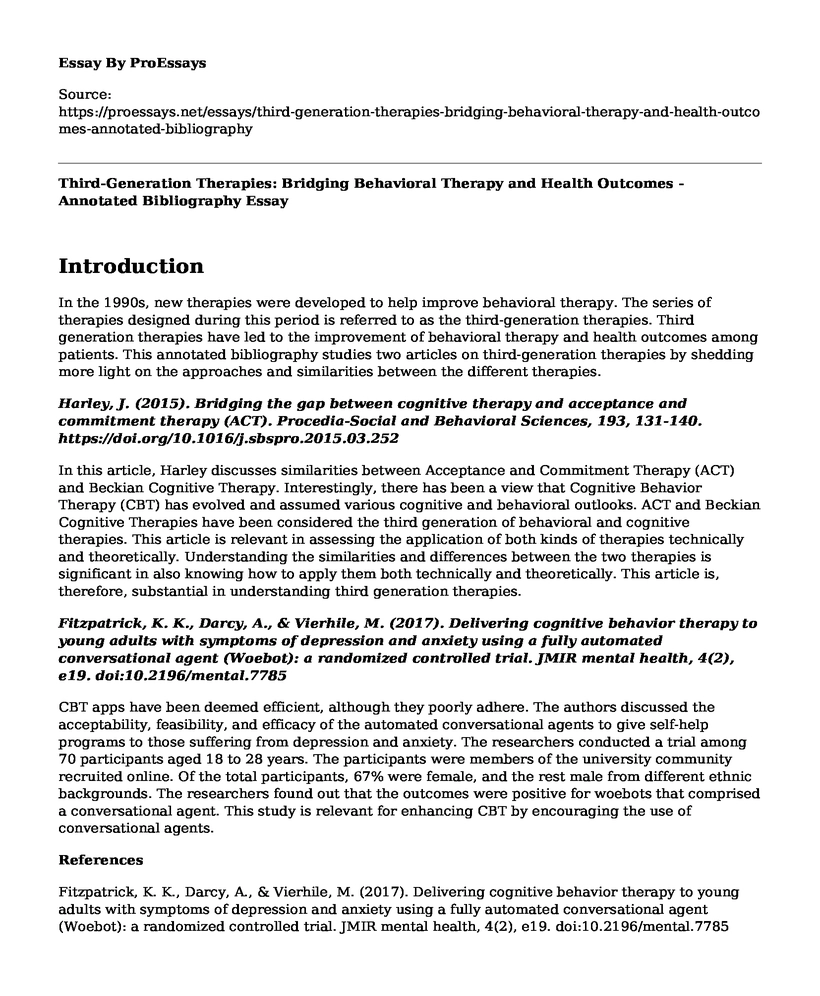Introduction
In the 1990s, new therapies were developed to help improve behavioral therapy. The series of therapies designed during this period is referred to as the third-generation therapies. Third generation therapies have led to the improvement of behavioral therapy and health outcomes among patients. This annotated bibliography studies two articles on third-generation therapies by shedding more light on the approaches and similarities between the different therapies.
Harley, J. (2015). Bridging the gap between cognitive therapy and acceptance and commitment therapy (ACT). Procedia-Social and Behavioral Sciences, 193, 131-140. https://doi.org/10.1016/j.sbspro.2015.03.252
In this article, Harley discusses similarities between Acceptance and Commitment Therapy (ACT) and Beckian Cognitive Therapy. Interestingly, there has been a view that Cognitive Behavior Therapy (CBT) has evolved and assumed various cognitive and behavioral outlooks. ACT and Beckian Cognitive Therapies have been considered the third generation of behavioral and cognitive therapies. This article is relevant in assessing the application of both kinds of therapies technically and theoretically. Understanding the similarities and differences between the two therapies is significant in also knowing how to apply them both technically and theoretically. This article is, therefore, substantial in understanding third generation therapies.
Fitzpatrick, K. K., Darcy, A., & Vierhile, M. (2017). Delivering cognitive behavior therapy to young adults with symptoms of depression and anxiety using a fully automated conversational agent (Woebot): a randomized controlled trial. JMIR mental health, 4(2), e19. doi:10.2196/mental.7785
CBT apps have been deemed efficient, although they poorly adhere. The authors discussed the acceptability, feasibility, and efficacy of the automated conversational agents to give self-help programs to those suffering from depression and anxiety. The researchers conducted a trial among 70 participants aged 18 to 28 years. The participants were members of the university community recruited online. Of the total participants, 67% were female, and the rest male from different ethnic backgrounds. The researchers found out that the outcomes were positive for woebots that comprised a conversational agent. This study is relevant for enhancing CBT by encouraging the use of conversational agents.
References
Fitzpatrick, K. K., Darcy, A., & Vierhile, M. (2017). Delivering cognitive behavior therapy to young adults with symptoms of depression and anxiety using a fully automated conversational agent (Woebot): a randomized controlled trial. JMIR mental health, 4(2), e19. doi:10.2196/mental.7785
Harley, J. (2015). Bridging the gap between cognitive therapy and acceptance and commitment therapy (ACT). Procedia-Social and Behavioral Sciences, 193, 131-140. https://doi.org/10.1016/j.sbspro.2015.03.252
Cite this page
Third-Generation Therapies: Bridging Behavioral Therapy and Health Outcomes - Annotated Bibliography. (2023, Mar 26). Retrieved from https://proessays.net/essays/third-generation-therapies-bridging-behavioral-therapy-and-health-outcomes-annotated-bibliography
If you are the original author of this essay and no longer wish to have it published on the ProEssays website, please click below to request its removal:
- Hume Moral Judgments and Self-Love Theories Essay
- The Pursuit of Happiness Paper Example
- Self-Awareness Paper Example
- Essay Sample on The Ideal Love
- Essay Sample on Depression: A Modern-Day Disaster Causing Sleep Disorders
- Essay Example on ADHD in Children: Common & Increasingly Prevalent
- Essay Sample on Group Therapy: A Psychotherapeutic Approach to Treating Addiction







